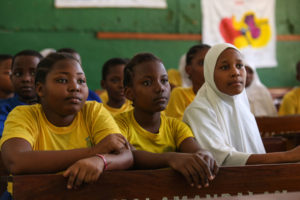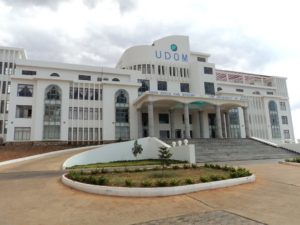by Ben Taylor
School fees abolishment – popular but problematic
A new survey by Twaweza, a non-governmental organisation, has found that the abolishment of school fees and related parental contributions is a highly popular move. In their regular Sauti za Wananchi (Voices of the People) panel survey, Twaweza found that 76% of citizens believe that making education free will improve quality. Further, 88% were confident that the new policy would be implemented on time.
Nevertheless, a significant minority (15%) expressed concern that free education will lead to a surge in enrolment that will stretch resources and lead to a decline in the quality of schooling.
This concern would appear to be born out, at least in part, but evidence from primary schools across the country when the new school-year started in January. The Citizen newspaper reported that enrolment in Standard One had tripled in some schools. One school in Dar es Salaam previously enrolled 250-300 pupils per year, and had planned for around 400 this year anticipating the effect of the school fees’ abolishment, but found itself enrolling over 600 pupils. The school has been forced to cram over 150 pupils into each of four Standard One classrooms. The paper reported similar situations in primary schools nationwide.
Mr George Simbachawene, Minister in the President’s Office for Regional Administration and Local Government, said he had directed all district and regional commissioners to fast-track construction of new classrooms to address local shortages.
Earlier, the government disbursed TSh 18bn (approx. £6m) to schools across the country, as part of TSh 137bn set aside by the government to implement the free education promise, covering the first six months. Prime Minister Kassim Majaliwa stated that the government had calculated the amount needed and was comfortable that it could afford the cost of providing free education.
As part of the new policy, the government has promised to cover examination fees and has abolished parental contributions towards school expenses. Parents are still required to cover some costs, including the purchase of school uniforms, exercise books and pens, and medical expenses.
The same Twaweza survey found that nine out of ten parents reported previously paying contributions to school running costs, including school security, tests and desks. 80% reported that this came to under TSh 50,000 per year, while 8% reported that it added up to over TSh 100,000. Half the parents surveyed (49%) said they didn’t think schools were using these contributions for the correct purposes, with many suggesting it was used instead to supplement teachers’ income.
When asked to advise the government on how to best improve the quality of education, 82% focussed on teacher-related issues. This group was split between those who said the main focus should be on monitoring teacher performance (40%) and those who said improving teachers’ pay and conditions should be the priority (32%).
Form Four (O-level) results show small decline
The National Examinations Council released Form Four (O-level) results for students who took the exams late in 2015. The results showed a slight decline in the pass rate, from 70% of students passing in the previous year to 68% this year. Only 25% achieved divisions one to three.
Mathematics had the lowest pass rate by some distance, with only 17% of candidates who attempted the subject passing, down from 20% in 2014. Kiswahili had the highest pass rate after 78% per cent of candidates passed, up from 70% the previous year.
The Minister of Education, Prof. Joyce Ndalichako, said she was not impressed with the results. She was reported as saying that for many years government-run schools had been performing badly.
The Minister said she would begin by inviting head teachers based in Dar es Salaam to a meeting to discuss how the region could set standards for performance.
HakiElimu programme manager for Research and Analysis, Mr Godfrey Bonaventura, argued that ward schools were the places where most of the division fours and failures were produced, so the Minister needed to give them a special focus. He said the schools started taking in students even before they were complete.
“A decade ago, when ward level secondary schools were established, what mattered then was seeing to it that the schools had classrooms, some teachers, toilets and students. But that is not all it takes to provide quality education. A simple visit to such a school today will reveal a sad reality as buildings are in a poor state, they are ill-equipped and staff are demoralised. It’s sad.”
He challenged the government to increase funding in the Education sector, saying the focus should not only be on urban-centred schools but even those in remote areas.
Official data shows that Standard Seven national examination pass average declined from 54% in 2007 to 31% in 2012. Form Four national examination pass rate declined from 90% in 2007 to 43% in 2012, before rising sharply when new grading systems were introduced.
New exam scoring system abandoned
The grade point average (GPA) system, introduced in 2014, will no longer be used to score candidates in O-level and A-level examinations. Instead, the previous “division” system will be reintroduced. This was announced by the Minister of Education and Vocational Training, Prof. Joyce Ndalichako. The Minister said the decision was based on the failure of the National Examinations Council, NECTA, to justify the GPA system. She said many stakeholders did not understand the GPA scores.
Prof. Ndalichako added that the shift to GPA appeared to have resulted in a lowering of the cut-off point for passing exams, leading to many students appearing to have performed better than was truly the case. The move was applauded by education sector specialists, many of whom focussed on how the introduction of GPA had been used to cover up a lowering of standards.
HakiElimu acting director Godfrey Bonaventura said that the GPA grading system was unjustifiable. “We’ve many challenges in the sector that need to be addressed, scheming to hide the declining quality of education through adopting a new grading system without justification was wrong,” he said.
Professor Issa Omari of the Open University of Tanzania said that in some ways the debate was academic, as the GPA and division systems were entirely interchangeable, but that he supported the Minister’s move on the grounds that the division system was well understood by stakeholders in Tanzania.
Prof. Omari emphasised that the key point was the cut-off points for passing examinations, and criticised the previous administration for lowering the standards required for a pass. “We are cheating ourselves and the public by playing around with cut-off points, as students will have a hard time out there in the world of work,” he said.
Executive Secretary of NECTA, Dr Charles Msonde, appealed to education stakeholders to continue working with Necta and advising it, saying this would help the council to improve its performance. He said he welcomed feedback from stakeholders as part of efforts to bring about positive and desirable change in the education sector in general.
Delivering better outcomes in education – what works?
A newly published study by Twaweza has investigated alternative approaches to improving learning outcomes in Tanzania.
The organisation compared students’ learning outcomes between four different interventions: one in which they provided schools with extra resources through capitation (per-pupil) grants, one in which they provided teachers with a bonus based on the performance of their students in an externally administered exam, one in which schools received both programs, and the control group which received no support.
The study was conducted as a randomised controlled trial (RCT), in 350 government-run primary schools in ten districts of Tanzania between 2013 and 2014. The study found that improving delivery of inputs (funding) to schools had no significant impact on learning outcomes, and nor did providing bonus payments to teachers. However, in schools where both interventions were implemented concurrently, there was a significant positive impact on learning outcomes.
The research, known as KiuFunza (Thirst for Learning), was carried out in partnership with Tanzania Commission for Science and Technology, the Ministry of Education and Innovations for Poverty Action (IPA), a US-based research organisation.



